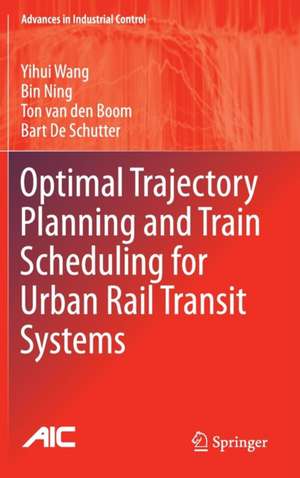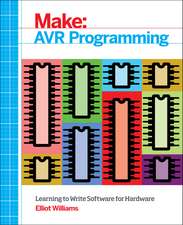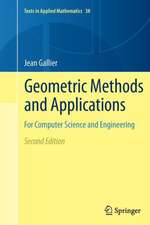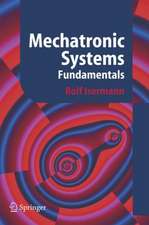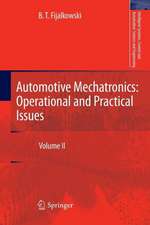Optimal Trajectory Planning and Train Scheduling for Urban Rail Transit Systems: Advances in Industrial Control
Autor Yihui Wang, Bin Ning, Ton van den Boom, Bart De Schutteren Limba Engleză Hardback – 3 mai 2016
Mixed-integer linear programming and pseudospectral methods are among the new methods proposed for single- and multi-train systems for the solution of the nonlinear trajectory planning problem which involves constraints such as varying speed restrictions and maximum traction/braking force. Signaling systems and their effects are also accounted for in the trajectory planning model. Origin–destination passenger demand is included in the model formulation for train scheduling. Iterative convex programming and efficient bi-level approaches are utilized in the solution of the train-scheduling problem. In addition, the splitting rates and route choices of passengers are also optimized from the system point of view.
The problems and solutions described in Optimal Trajectory Planning and Train Scheduling for Urban Rail Transit Systems will interest researchers studying public transport systems and logistics whether from an academic or practitioner background as well as providing a real application for anybody studying optimization theory and predictive control.
| Toate formatele și edițiile | Preț | Express |
|---|---|---|
| Paperback (1) | 635.80 lei 6-8 săpt. | |
| Springer International Publishing – 27 mai 2018 | 635.80 lei 6-8 săpt. | |
| Hardback (1) | 642.03 lei 6-8 săpt. | |
| Springer International Publishing – 3 mai 2016 | 642.03 lei 6-8 săpt. |
Din seria Advances in Industrial Control
- 15%
 Preț: 643.34 lei
Preț: 643.34 lei - 23%
 Preț: 582.63 lei
Preț: 582.63 lei - 18%
 Preț: 783.98 lei
Preț: 783.98 lei - 18%
 Preț: 947.35 lei
Preț: 947.35 lei - 20%
 Preț: 568.24 lei
Preț: 568.24 lei - 15%
 Preț: 643.16 lei
Preț: 643.16 lei - 18%
 Preț: 899.21 lei
Preț: 899.21 lei - 18%
 Preț: 891.33 lei
Preț: 891.33 lei - 18%
 Preț: 740.57 lei
Preț: 740.57 lei - 18%
 Preț: 961.23 lei
Preț: 961.23 lei - 18%
 Preț: 955.08 lei
Preț: 955.08 lei - 15%
 Preț: 645.28 lei
Preț: 645.28 lei - 15%
 Preț: 638.43 lei
Preț: 638.43 lei - 18%
 Preț: 901.11 lei
Preț: 901.11 lei - 18%
 Preț: 1410.94 lei
Preț: 1410.94 lei - 18%
 Preț: 728.91 lei
Preț: 728.91 lei - 20%
 Preț: 1003.77 lei
Preț: 1003.77 lei - 18%
 Preț: 947.35 lei
Preț: 947.35 lei - 15%
 Preț: 643.34 lei
Preț: 643.34 lei - 15%
 Preț: 654.30 lei
Preț: 654.30 lei - 18%
 Preț: 950.52 lei
Preț: 950.52 lei - 15%
 Preț: 644.30 lei
Preț: 644.30 lei - 18%
 Preț: 1393.09 lei
Preț: 1393.09 lei - 18%
 Preț: 950.21 lei
Preț: 950.21 lei - 18%
 Preț: 949.90 lei
Preț: 949.90 lei - 18%
 Preț: 949.42 lei
Preț: 949.42 lei - 18%
 Preț: 950.52 lei
Preț: 950.52 lei - 18%
 Preț: 1113.71 lei
Preț: 1113.71 lei - 15%
 Preț: 650.04 lei
Preț: 650.04 lei - 15%
 Preț: 644.95 lei
Preț: 644.95 lei - 18%
 Preț: 950.33 lei
Preț: 950.33 lei - 18%
 Preț: 948.61 lei
Preț: 948.61 lei - 18%
 Preț: 1112.60 lei
Preț: 1112.60 lei - 15%
 Preț: 644.63 lei
Preț: 644.63 lei - 18%
 Preț: 953.20 lei
Preț: 953.20 lei - 18%
 Preț: 945.62 lei
Preț: 945.62 lei - 15%
 Preț: 640.88 lei
Preț: 640.88 lei - 15%
 Preț: 640.88 lei
Preț: 640.88 lei - 20%
 Preț: 650.92 lei
Preț: 650.92 lei - 18%
 Preț: 1112.60 lei
Preț: 1112.60 lei - 20%
 Preț: 998.36 lei
Preț: 998.36 lei - 15%
 Preț: 643.34 lei
Preț: 643.34 lei - 18%
 Preț: 948.92 lei
Preț: 948.92 lei - 18%
 Preț: 1381.43 lei
Preț: 1381.43 lei - 15%
 Preț: 651.51 lei
Preț: 651.51 lei - 15%
 Preț: 647.08 lei
Preț: 647.08 lei - 20%
 Preț: 563.66 lei
Preț: 563.66 lei - 18%
 Preț: 998.03 lei
Preț: 998.03 lei - 18%
 Preț: 1225.79 lei
Preț: 1225.79 lei
Preț: 642.03 lei
Preț vechi: 755.33 lei
-15% Nou
Puncte Express: 963
Preț estimativ în valută:
122.87€ • 128.11$ • 102.11£
122.87€ • 128.11$ • 102.11£
Carte tipărită la comandă
Livrare economică 20 martie-03 aprilie
Preluare comenzi: 021 569.72.76
Specificații
ISBN-13: 9783319308883
ISBN-10: 3319308882
Pagini: 184
Ilustrații: XXI, 180 p. 59 illus., 2 illus. in color.
Dimensiuni: 155 x 235 x 13 mm
Greutate: 0.46 kg
Ediția:1st ed. 2016
Editura: Springer International Publishing
Colecția Springer
Seria Advances in Industrial Control
Locul publicării:Cham, Switzerland
ISBN-10: 3319308882
Pagini: 184
Ilustrații: XXI, 180 p. 59 illus., 2 illus. in color.
Dimensiuni: 155 x 235 x 13 mm
Greutate: 0.46 kg
Ediția:1st ed. 2016
Editura: Springer International Publishing
Colecția Springer
Seria Advances in Industrial Control
Locul publicării:Cham, Switzerland
Cuprins
Introduction.- Background: Train Operation and Scheduling.- Optimal Trajectory Planning for a Single Train.- Optimal Trajectory Planning for Multiple Trains.- OD-Independent Train Scheduling for an Urban Rail Transit Line.- OD-Dependent Train Scheduling for an Urban Rail Transit Line.- OD-Dependent Train Scheduling for an Urban Rail Transit Network.- Overview and Future Directions.- Appendix: A General Formulation of the Pseudospectral Method.
Notă biografică
Yihui Wang received the B.Sc in control engineering from the School of Electronic and Information Engineering, Beijing Jiaotong University in 2007. She became a Ph.D. student at Delft Center for Systems and Control, Delft University of Technology in September 2010 and obtained the Ph.D. degree in November, 2014. She is currently an assistant professor at the State Key Laboratory of Rail Traffic Control and Safety, Beijing Jiaotong University. Her main research interests include train scheduling, energy-efficient train control, hybrid systems, and model predictive control.
Bart De Schutter received the M.Sc. degree in electrotechnical and mechanical engineering and the Ph.D. degree in applied sciences (summa cum laude with congratulations of the examination jury) from the K.U.Leuven, Leuven, Belgium, in 1991 and 1996, respectively. He is currently a Full Professor with the Delft Center for Systems and Control, Delft University of Technology, Delft, The Netherlands. His current research interests include the control of intelligent transportation systems, hybrid system control, and multiagent systems. Prof. De Schutter is an Associate Editor for Automatica and for the IEEE Transactions on Intelligent Transportation Systems.
Bin Ning received the B.S. degrees from Northern Jiaotong University (now Beijing Jiaotong University), Beijing, China, in 1982, where he received both the M.S. and Ph.D. degrees afterwards. He is currently a full professor with the State Key Laboratory of Rail Traffic Control and Safety, Beijing Jiaotong University, as well as the President of Beijing Jiaotong University. His research interests include intelligent transportation systems, communication-based train control, rail transport systems, system fault-tolerant design, fault diagnosis, system reliability, and safety studies. Prof. Ning is a Fellow of the Institution of Railway Signal Engineers and IET, a Senior Member of the China Railway Society, and a member of theWestern Returned Scholars Association. He is the Chair of the Technical Committee on Railroad Systems and Applications of the IEEE Intelligent Transportation Systems Society.
Ton van den Boom received the MSc and PhD degrees in Electrical Engineering from Eindhoven University of Technology, Eindhoven, The Netherlands, in 1988 and 1993, respectively. Currently he is an Associate Professor at Delft University of Technology, The Netherlands. His research interests are in the areas of linear and nonlinear model predictive control, control and identification of discrete event systems and hybrid systems with applications in railway, robotics, and printers.
Bart De Schutter received the M.Sc. degree in electrotechnical and mechanical engineering and the Ph.D. degree in applied sciences (summa cum laude with congratulations of the examination jury) from the K.U.Leuven, Leuven, Belgium, in 1991 and 1996, respectively. He is currently a Full Professor with the Delft Center for Systems and Control, Delft University of Technology, Delft, The Netherlands. His current research interests include the control of intelligent transportation systems, hybrid system control, and multiagent systems. Prof. De Schutter is an Associate Editor for Automatica and for the IEEE Transactions on Intelligent Transportation Systems.
Bin Ning received the B.S. degrees from Northern Jiaotong University (now Beijing Jiaotong University), Beijing, China, in 1982, where he received both the M.S. and Ph.D. degrees afterwards. He is currently a full professor with the State Key Laboratory of Rail Traffic Control and Safety, Beijing Jiaotong University, as well as the President of Beijing Jiaotong University. His research interests include intelligent transportation systems, communication-based train control, rail transport systems, system fault-tolerant design, fault diagnosis, system reliability, and safety studies. Prof. Ning is a Fellow of the Institution of Railway Signal Engineers and IET, a Senior Member of the China Railway Society, and a member of theWestern Returned Scholars Association. He is the Chair of the Technical Committee on Railroad Systems and Applications of the IEEE Intelligent Transportation Systems Society.
Ton van den Boom received the MSc and PhD degrees in Electrical Engineering from Eindhoven University of Technology, Eindhoven, The Netherlands, in 1988 and 1993, respectively. Currently he is an Associate Professor at Delft University of Technology, The Netherlands. His research interests are in the areas of linear and nonlinear model predictive control, control and identification of discrete event systems and hybrid systems with applications in railway, robotics, and printers.
Textul de pe ultima copertă
This book contributes to making urban rail transport fast, punctual and energy-efficient –significant factors in the importance of public transportation systems to economic, environmental and social requirements at both municipal and national levels. It proposes new methods for shortening passenger travel times and for reducing energy consumption, addressing two major topics: (1) train trajectory planning: the authors derive a nonlinear model for the operation of trains and present several approaches for calculating optimal and energy-efficient trajectories within a given schedule; and (2) train scheduling: the authors develop a train scheduling model for urban rail systems and optimization approaches with which to balance total passenger travel time with energy efficiency and other costs to the operator.
Mixed-integer linear programming and pseudospectral methods are among the new methods proposed for single- and multi-train systems for the solution ofthe nonlinear trajectory planning problem which involves constraints such as varying speed restrictions and maximum traction/braking force. Signaling systems and their effects are also accounted for in the trajectory planning model.
Origin–destination passenger demand is included in the model formulation for train scheduling. Iterative convex programming and efficient bi-level approaches are utilized in the solution of the train-scheduling problem. In addition, the splitting rates and route choices of passengers are also optimized from the system point of view.The problems and solutions described in Optimal Trajectory Planning and Train Scheduling for Urban Rail Transit Systems will interest researchers studying public transport systems and logistics whether from an academic or practitioner background as well as providing a real application for anybody studying optimization theory and predictive control.
Mixed-integer linear programming and pseudospectral methods are among the new methods proposed for single- and multi-train systems for the solution ofthe nonlinear trajectory planning problem which involves constraints such as varying speed restrictions and maximum traction/braking force. Signaling systems and their effects are also accounted for in the trajectory planning model.
Origin–destination passenger demand is included in the model formulation for train scheduling. Iterative convex programming and efficient bi-level approaches are utilized in the solution of the train-scheduling problem. In addition, the splitting rates and route choices of passengers are also optimized from the system point of view.The problems and solutions described in Optimal Trajectory Planning and Train Scheduling for Urban Rail Transit Systems will interest researchers studying public transport systems and logistics whether from an academic or practitioner background as well as providing a real application for anybody studying optimization theory and predictive control.
Advances in Industrial Control aims to report and encourage the transfer of technology in control engineering. The rapid development of control technology has an impact on all areas of the control discipline. The series offers an opportunity for researchers to present an extended exposition of new work in all aspects of industrial control.
Caracteristici
Takes forward efforts to reduce the energy and financial costs of public transportation at the same time as increasing speed and reliability Provides the reader with modeling techniques that can cope with single trains in detail or with more general multi-train systems Shows how variable scheduling can accommodate variable passenger demand Includes supplementary material: sn.pub/extras
